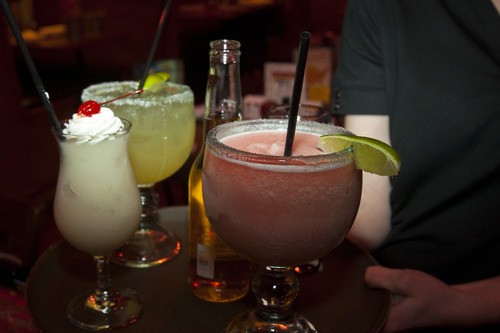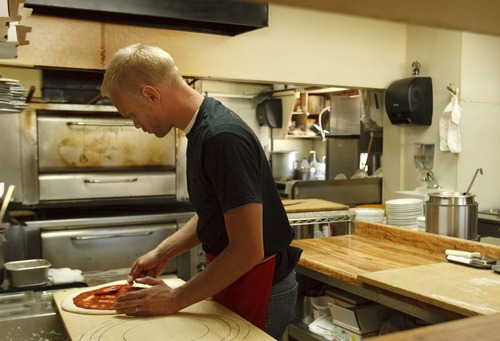This is an archived article that was published on sltrib.com in 2013, and information in the article may be outdated. It is provided only for personal research purposes and may not be reprinted.
Undercover liquor cops are fanning across the state to bust Utah restaurants that serve alcohol with free appetizers or no food at all.
Lawmakers authorized the sting teams and then tied the number of liquor cops to increases in liquor permits. The State Bureau of Investigations, in turn, has informed restaurants and clubs that more officers will be doing more checks. And that's in addition to local agencies that also are authorized to conduct covert operations at Utah eateries.
The largest number of stings on the 19-member state enforcement team center on whether restaurants are serving minors. But an increasing number of undercover operations are focusing on whether restaurants are serving alcohol without requiring customers to order food. Fines for the violation, deemed "serious," start at $500 for the first offense and can go up to $3,000.
These types of violations — once rare — have jumped to 32 cases adjudicated since December, compared with none in the prior year.
Undercover officers are relying on a variety of tactics in the stings, according to records of 20 cases at eateries from as far south as Cedar City, obtained by The Salt Lake Tribune under the state's Government Records Access and Management Act, or GRAMA.
The records show that agents are telling servers they want only a beer — no food— while, say, their wives are shopping or they wait for a movie. Or they say they're good with just a drink. They're also busting servers who bring free appetizers, a violation of state law mandating that imbibers in restaurants pay for an accompanying order of food.
A sting at Piccolo Brother's Pizza & Pasta in Ogden began with three agents ordering beers. They said they had just eaten at the nearby Wing Wah Restaurant "and we just wanted to come over and get a drink," records show.
Their server brought them beers. But the part-time worker, a 23-year-old kindergarten teacher, asked her manager about what she believed was an odd order. She returned, apologized and said that by law they had to order food. She suggested an appetizer, but the agents refused. She then offered to buy them garlic bread.
"I accept responsibility for my mistakes," she said in an interview. "But I can also say that I tried to do the right thing to fix the problem that I had made."
The agents paid for their beers and left a $3 tip. Notification of the violation came days later.
And the free garlic bread?
"They ate it," she said. "Before they left, it was gone."
The bust at Piccolos, which has no history of violations, carried a $500 fine or a five-day liquor license suspension. The owner, in business for 32 years, agreed to the suspension and paid $127 in administrative costs. And unlike many restaurateurs, he did not fire the server.
Lou Bertram, a retired FBI agent who teaches alcohol training classes for servers, questions whether public safety objectives are met in these types of liquor busts on eateries.
"Do you see drunk people staggering out of restaurants?" he asked. "Is this the real world or does this border on fantasy land?"
Capt. Brian Redd, with State Bureau of Investigations, said problems at Piccolos were compounded when the server belatedly attempted to comply with the law. It took her 20 minutes to return to the table, she purchased the appetizer and on a minor note, she was not wearing her state-mandated name tag.
"All servers have to do is ask customers if they intend to order food before they serve an alcoholic beverage," he said. "Complying with the law is that simple."
Major Jeff Carr, SBI deputy director, said a bust at Wing Wah in Ogden also was justified, but he added that agents may be doing fewer of these stings. In this instance, two undercover officers ordered sodas and food, while a third agent at the table asked for a Bud Light, telling the server that he wanted only a drink.
"We're trying to enforce the law, we're not trying to create a hardship on servers when there are several people at a table," said Carr. "We want to follow the spirit of the law so we may be making some adjustments."
Wing Wah opted for a five-day liquor license suspension.
Signage posting the state law about alcohol and food purchases doesn't deter agents from angling to make a bust.
When undercover officers hit the Fox Hole pub in West Jordan, they walked past a warning, "As of today, all alcohol purchases must be accompanied with a food purchase. This is state law. Thank you."
The server brought the three undercover officers Corona beers after checking their IDs. When she came back and "asked if we wanted any food, we said, no," according to the agents' report.
The pub paid a $500 fine.
Since then, if someone refuses to order food, said Fox Hole owner James Baity, "I expect servers to confiscate the beer. I would not like this if I was a patron, but as a business owner I have no choice."
Owners may contest violations, but attorney fees range from $10,000 to $20,000, putting that option out of reach for many small operators.
The food crackdown began in December after state liquor compliance director Nina McDermott issued a memo explicitly telling trainers who instruct servers on alcohol laws that diners could be served drinks only after they first placed an order for food. After an outcry from the hospitality industry, liquor-control agency director Salvador Petilos said there had been a misunderstanding about the directive and that diners were allowed to be served drink so long as they signaled an intent to order food.
Earlier this year, lawmakers underscored the right of patrons to sip alcoholic beverages while looking at menus with the passage of HB240. The Department of Alcoholic Beverage Control, in turn, must define what the law means, particularly when it comes to individual patrons — including each customer in a large group.
Melva Sine, executive director of the Utah Restaurant Association, worries that the law will end up confusing diners who reserve tables or study menus and are still interrogated about whether they're planning to order a meal. State law also requires 70 percent of all receipts at restaurants to come from food, so it's unlikely eateries are becoming like bars that have no similar requirements.
"We need to establish laws that promote a good business climate and a hospitable atmosphere," she said. "It's assumed that people going into a restaurant are not going there to buy groceries, they are going there to dine. That is something that's not assumed in a sting operation."
twitter@DawnHouseTrib —
When may Utah diners order drinks? It depends
The law • HB240, which went into effect in May, clarifies that restaurant patrons may order an alcoholic drink as long as they show an "intent" to buy food.
Liquor board • The Alcoholic Beverage Control Commission must establish rules defining what "intent" means. For instance, does reserving a table show that diners intend to order food? And what must servers do to ensure that each individual in a large group orders food along with drinks?
Rules • The DABC will meet with an advisory board with the goal of presenting administrative rules at the July 30 commission meeting. The rule-making process would begin at that time.
Public comment • The proposed rule may be filed by Aug. 1 for publication in the Aug. 15 Utah State Bulletin and be available online at http://abc.utah.gov/. Public comment to the DABC would end on Sept. 16, with Sept. 23 as a tentative effective date. —
Complaints? Questions?
Diners with concerns about a particular liquor sting, or hospitality owners and workers with questions, should call Lt. Troy Marx with the State Bureau of Investigations at 801-532-2168





